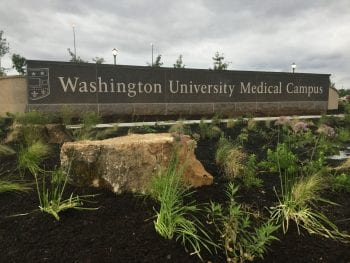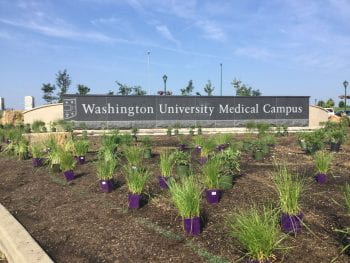In November 2019, the Operations & Facilities Management Department announced the placement of a new Kingshighway Interchange Monument sign at Kingshighway Boulevard and Highway 64/40 as well as numerous landscape improvements to beautify the School of Medicine campus.
This project was an enhancement to the campus signage and wayfinding plan to improve entrance visibility and to align with the standards recently installed by the BJC Campus Renewal Project. The project started on January 28, 2019 and was completed on June 12, 2019.
Besides the new sign, the project also involved numerous landscape improvements which are listed below.
- Removing 5,500 square feet per side of turf (11,000 square feet total) and converted to planting bed. This eliminates the need to mow weekly (approximately 30 occurrences per year), which in turn reduces emissions, fertilizers, chemical and water usage. It also makes the area safer for maintenance personnel and passing motorists.
- Installed 3,361 plants per side (6,722 plants total) of which 6,002 plants were native or native cultivars and 720 were ornamental adaptable plants. All of the perennials were sourced and grown from local St. Louis growers.
- Planted 15 lbs of native seed per side (30 lbs total) to give a quick green cover to reduce weed pressure in center of island. Seed was sourced from a local St. Louis seed supplier.
- After planting, within a few hours, we observed several honey bees, bumble bees, swallowtail butterflies and dragonflies visiting the new plants and garden. With the native plants, the biodiversity in the garden will continue to increase overtime.
- Used 60 yards of compost to amend the soil which will increase water holding capacity, reduce run off and increase biological activity in the soil. Compost was also sourced from a local St. Louis supplier.
- Converted all spray heads to high efficiency MP rotator heads. The irrigation system will be used heavily the first year for establishment; however, once established the native plants will need significantly less irrigation.
If you have any questions, please contact Allan Miller, Project Manager.

